Articles about reggae music, reviews, interviews, reports and more...
Interview: Perfect (2010)
- Home
- Articles
- Interviews
- Interview: Perfect (2010)

Interview: Perfect (2010)
"As an artiste, reggae is my life, it’s my job, it’s my work, it’s my play. It’s my everything. We’re always creating songs and ideas, and we work with reggae music all day everyday "
Sampler
In conjunction with Perfect’s brief string of western US shows in May, Jessica Dore caught up with the artiste to talk about music, religion, Jamaica and the world’s best red suspenders.
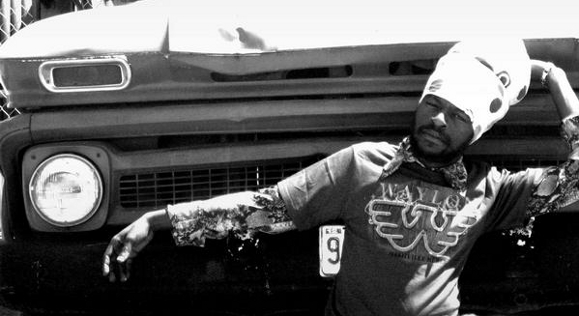
You came out with Born Dead with Life in 2008, which was followed by both French Connection and Karma in 2009. It’s worth mentioning that Karma is also chock full of love songs. What was going on in your life during that period that you were creating and recording so much music?
As an artiste, reggae is my life, it’s my job, it’s my work, it’s my play. It’s my everything. We’re always creating songs and ideas, and we work with reggae music all day everyday. So there’s always a force of music that is inside of us to be released. 2009 was just one of those years. French Connection was really the album that everyone was looking for, but Karma was just an album to show my fans that there’s a much softer side to Perfect. You know because a lot of people are used to hearing this loud Giddimani artist, rough voice. Karma was a little bit softer and smoother. A lot of the songs were love songs but it was still with the Rastafarian concept that I usually write. 2009 was the year to show both sides of perfect; French Connection was the regular side of what most people know of Perfect, and Karma was the more soulful side.
On the cover of 'Born Dead With Life', there’s an image with a skull and a baby, side by side. Tell me a little bit about the significance of that image.
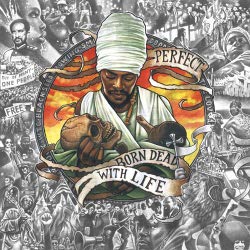 A lot of people when they just saw that album they were a little bit scared. A lot of people had different comments to say from around the Rastafarian community. The skull represents the remains of a human being. A lot of people look at a skull in a negative way. But in fact, every one of us has a skull, and a skull is a natural breakdown of a human, yeah? And then, on the picture there is a baby. So it’s showing the pathway, the tunnel-way to being, life and death, you know? That is really what that picture is depicting.
A lot of people when they just saw that album they were a little bit scared. A lot of people had different comments to say from around the Rastafarian community. The skull represents the remains of a human being. A lot of people look at a skull in a negative way. But in fact, every one of us has a skull, and a skull is a natural breakdown of a human, yeah? And then, on the picture there is a baby. So it’s showing the pathway, the tunnel-way to being, life and death, you know? That is really what that picture is depicting.
And it’s surrounded by images of political leaders and other evocative images…
Yes definitely, it’s surrounded by a whole bunch of images from African history and the reason is that we’ve been through great tribulations, you know, we’ve been through slavery and a whole bunch of other stuff and a lot of our ancestors had to die in order for us to live. So the skull is still representing our ancestors who’ve passed away, and the baby is that new born, that new life, of people who had fought. I mean, after slavery, we weren’t compensated. We never got reparations. We as a people, we seemed a bit hopeless after being enslaved and not given anything for our compensation. So, the majority of the children that were born within that time, they were born almost hopeless, they were almost born dead—with life, they had life—but throughout the passage of time, we have overcome that. Black people have become lawyers, doctors, great musicians, there is a black president. We have come a far way, and as I said before, in order for us to survive and to live, enough of our ancestors had to die.
 Black people have become lawyers, doctors, great musicians, there is a black president. We have come a far way, and as I said before, in order for us to survive and live, enough of our ancestors had to die
Black people have become lawyers, doctors, great musicians, there is a black president. We have come a far way, and as I said before, in order for us to survive and live, enough of our ancestors had to die
Were you raised with religion?
Yes I was raised in a Christian home because my mother was a Christian. But growing up and venturing to different areas and meeting people, I got introduced to knowledge of Rastafari.
I read an older interview where you talked about a Rastaman known as King Samuel who you spent some time with. I wanted to hear more about what he taught you.
Yes, King Samuel was a Rastaman who after coming from high school I used to go visit his house. His lifestyle, his thoughts, and his ideas were much different from the people that I came in contact with in the street, or at school, or in my house, where I was from.
What kinds of things did you learn from him?
In terms of livity, in terms of diet and eating, principles, thoughts and concepts. They were much different from what I was accustomed to over the years.
Your performance style…You have this fierce, energetic performance style, your own different kind of energy. I’m curious about people you’ve seen or performed with who have influenced you.
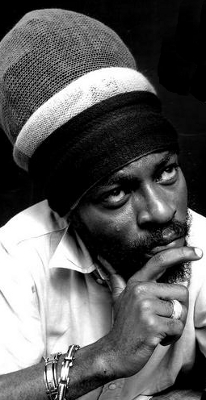 I have taken a lot of influence from a lot of different people. Even people from out of the genre of reggae music, you know. A whole bunch of different ingredients, a little bit of this a little bit of that. But I do have people that I admire from all different genres of music. From the reggae genre Bob Marley is of course an influence, Jimmy Cliff. Back into this era we have Buju Banton, we have Capleton, we have Anthony B, we have Sizzla. It goes on and on.
I have taken a lot of influence from a lot of different people. Even people from out of the genre of reggae music, you know. A whole bunch of different ingredients, a little bit of this a little bit of that. But I do have people that I admire from all different genres of music. From the reggae genre Bob Marley is of course an influence, Jimmy Cliff. Back into this era we have Buju Banton, we have Capleton, we have Anthony B, we have Sizzla. It goes on and on.
What about outside of the reggae genre?
I do like James Brown, I do like Marvin Gaye, I do like The Temptations. Other people, Michael Jackson is a great artist. I mean, any artist that really has an effect on me personally, I think that they can be of service to me. It doesn’t matter if you’re a reggae artist or not, if you can do something or say something that has an effect on me personally.
In the song Sersi-T you say, "No man never better than no man". What’s the significance of the tea?
Sersi is a potion to make usually by people that can’t afford to buy what’s on the shelves. That tea is not a tea that you will often find on the tabletop of the rich and the wealthy. It is also medicinal, but it is not something that you would find everyday in a high-end restaurant or an uptown home. So it’s mostly used by people who live in the country, that are poorer class. So in comparison to Tetley, Tetley Tea, the English brand; one you can just go in the backyard and pick it, and one you have to buy off the shelf. If you drink Sersi or if you drink Tetley, it doesn’t matter who you are, what you drink, no man is better than no man. It’s like, say, if you drink water or you drink a bottle of cognac. No man no better than no man; regardless of what you drink, what you eat, your position, class, color race, creed. No man is better than no man, a man is just a man. People might have different positions, but when you check the reality of it, it doesn’t matter. A man is just a man.
 No man no better than no man; regardless of what you drink, what you eat, your position, class, color race, creed. No man is better than no man, a man is just a man. People might have different positions, but when you check the reality of it, it doesn’t matter. A man is just a man
No man no better than no man; regardless of what you drink, what you eat, your position, class, color race, creed. No man is better than no man, a man is just a man. People might have different positions, but when you check the reality of it, it doesn’t matter. A man is just a man
You’ve shown some obvious hip-hop influences throughout your catalogue of tunes from albums 'Giddimani', 'Born Dead With Life' and 'French Connection' within songs like Da Rendition and Hit Dem. Who are your influences from the hip-hop world? And have you heard the new Nas and Damian album?
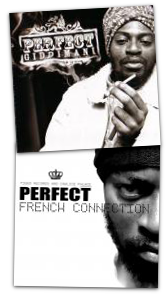 Yeah, I’m definitely influenced by hip-hop, I like Mos Def...I’ve heard it [Nas and Damian Marley’s Distant Relatives] and I think it’s pretty cool. I really like the vibe that both of them are bringing right now. Really good. Trust me. I’ve had an eye on them ever since they started working. It’s really good.
Yeah, I’m definitely influenced by hip-hop, I like Mos Def...I’ve heard it [Nas and Damian Marley’s Distant Relatives] and I think it’s pretty cool. I really like the vibe that both of them are bringing right now. Really good. Trust me. I’ve had an eye on them ever since they started working. It’s really good.
I have to ask your thoughts on the Dudus extradition situation in Jamaica right now.
There’s a way about everything, that there’s a right way and there’s a wrong way. And I just think that justice will prevail in the end, regardless of whatever might be. Right now we’re just trying to say a prayer for Jamaica, for our friends and our family. I’m just hoping the best for right now. I haven’t been back to Jamaica ever since this whole thing started, you know? I’m focused on my music and my family, and what is happening there is more…It’s more the politricks, to the Rastaman.
 There’s a way about everything, that there’s a right way and there’s a wrong way. And I just think that justice will prevail in the end, regardless of whatever might be. Right now we’re just trying to say a prayer for Jamaica, for our friends and our family
There’s a way about everything, that there’s a right way and there’s a wrong way. And I just think that justice will prevail in the end, regardless of whatever might be. Right now we’re just trying to say a prayer for Jamaica, for our friends and our family
I’ve heard a lot about airwaves censorship in Jamaica, blocking overtly sexual music from radio. That some artists are taking the blame for some of the behavioral problems among the Jamaican youth, specifically in terms of sex and violence.
The government stepped in and I think they’ve kind of resolved it a bit, but it was really getting out of hand. A lot of stuff was being played on the radio, which may be fit for older folks, but definitely not for young children. I think it was really bad. It was really getting out of hand. We need more conscious songs to be played on the radio, you know, you can’t have this stuff played in the hours when the children are awake, you know?
But is there potential for it to become a threat to freedom of speech, when the government decides what people can and can’t listen to?
No, I mean, people can always listen to what they want. We have the dancehall in the nighttime, you can pop your CD in, or play whatever you want on your Ipod. But radio, it’s played wherever, it’s played in the household where there are kids, and it’s easier for kids to turn the radio on. So, I think it was really a good move because certain stuff that pop up on the radio was really out of place.
What are the bands like that you play with on the road? Do you mostly play with different people each night or are you sometimes travelling with a band?
In Europe mostly I travel with one band, but in the US it’s a little bit different, depending on the budget that a promoter has. My last tour in Europe was with Jamaican musicians because the promoters had the money to do it. Sometimes you have to compromise and improvise.
Is it a challenge to play with musicians who have different styles than those you might play with if you had your pick? I wonder because you travel all over the world, and there are so many different schools and styles…
Once they’re professional, it’s all good. They can follow what you say and they’re good. Every artist has a different way of performing, but if a band that you’ve just met is professional, and they can play track for track, that’s just good enough.
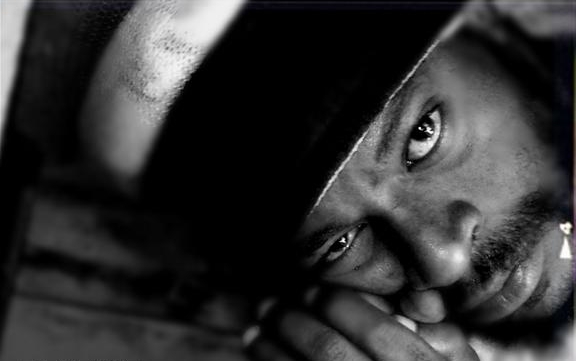
One last thing…I’ve seen some footage of you in some really awesome outfits. Specifically, those red suspenders with the red, gold and green waist piece…The most awesome thing ever. And then in the Rasta Dubplate video you’ve got the suspenders and the tie looking super fresh...Where’d you get this style from?
[Laughing] As I said, a little bit of this, a little bit of that! I take stuff from everywhere. I will buy suspenders in Switzerland, I’ll buy the tie in Italy and I’ll buy the shoes in Germany, I will get the pants in France. And I’ll get the shirt in Jamaica!
Where did you get those red suspenders, if you don’t mind me asking?
Those red suspenders….I think I got those in the US. Yeah, either US or France.
They’re so cool.
Thanks, man. I threw them away at this concert in Italy. I threw them up in the crowd. I usually do that. And then another year when I go back I see someone in the front row, red suspenders, I like that.
Lucky them…
Read more about this topic
Comments actually desactivated due to too much spams
Browse by categories
Recommended Articles
Latest articles
Recently addedView all
© 2007-2026 United Reggae. All Rights Reserved. Reproduction in whole or in part is prohibited. Read about copyright
Terms of use | About us | Contact us | Authors | Newsletter | A-Z














